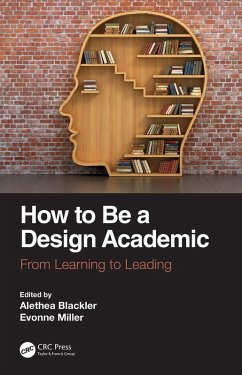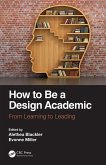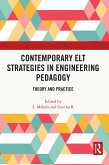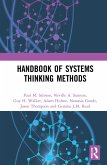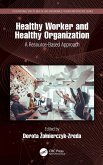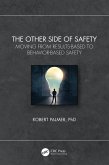How to Be a Design Academic (eBook, ePUB)
From Learning to Leading
Redaktion: Blackler, Alethea; Miller, Evonne
51,95 €
51,95 €
inkl. MwSt.
Sofort per Download lieferbar

26 °P sammeln
51,95 €
Als Download kaufen

51,95 €
inkl. MwSt.
Sofort per Download lieferbar

26 °P sammeln
Jetzt verschenken
Alle Infos zum eBook verschenken
51,95 €
inkl. MwSt.
Sofort per Download lieferbar
Alle Infos zum eBook verschenken

26 °P sammeln
How to Be a Design Academic (eBook, ePUB)
From Learning to Leading
Redaktion: Blackler, Alethea; Miller, Evonne
- Format: ePub
- Merkliste
- Auf die Merkliste
- Bewerten Bewerten
- Teilen
- Produkt teilen
- Produkterinnerung
- Produkterinnerung

Bitte loggen Sie sich zunächst in Ihr Kundenkonto ein oder registrieren Sie sich bei
bücher.de, um das eBook-Abo tolino select nutzen zu können.
Hier können Sie sich einloggen
Hier können Sie sich einloggen
Sie sind bereits eingeloggt. Klicken Sie auf 2. tolino select Abo, um fortzufahren.

Bitte loggen Sie sich zunächst in Ihr Kundenkonto ein oder registrieren Sie sich bei bücher.de, um das eBook-Abo tolino select nutzen zu können.
This book is about how to be a design academic. In another words, how to manage the various challenges, requirements, and processes that come with both the everyday and extra-orginary parts of an academic role in design fields (from architecture, urban design, and other spatial design fields, to fashion, industrial, interaction and graphic design.
- Geräte: eReader
- mit Kopierschutz
- eBook Hilfe
Andere Kunden interessierten sich auch für
![How to Be a Design Academic (eBook, PDF) How to Be a Design Academic (eBook, PDF)]() How to Be a Design Academic (eBook, PDF)51,95 €
How to Be a Design Academic (eBook, PDF)51,95 €![Contemporary ELT Strategies in Engineering Pedagogy (eBook, ePUB) Contemporary ELT Strategies in Engineering Pedagogy (eBook, ePUB)]() Contemporary ELT Strategies in Engineering Pedagogy (eBook, ePUB)44,95 €
Contemporary ELT Strategies in Engineering Pedagogy (eBook, ePUB)44,95 €![Empowering Women in STEM (eBook, ePUB) Empowering Women in STEM (eBook, ePUB)]() Empowering Women in STEM (eBook, ePUB)31,95 €
Empowering Women in STEM (eBook, ePUB)31,95 €![Making Changes in STEM Education (eBook, ePUB) Making Changes in STEM Education (eBook, ePUB)]() Julia M. WilliamsMaking Changes in STEM Education (eBook, ePUB)29,95 €
Julia M. WilliamsMaking Changes in STEM Education (eBook, ePUB)29,95 €![Handbook of Systems Thinking Methods (eBook, ePUB) Handbook of Systems Thinking Methods (eBook, ePUB)]() Paul M. SalmonHandbook of Systems Thinking Methods (eBook, ePUB)52,95 €
Paul M. SalmonHandbook of Systems Thinking Methods (eBook, ePUB)52,95 €![Healthy Worker and Healthy Organization (eBook, ePUB) Healthy Worker and Healthy Organization (eBook, ePUB)]() Healthy Worker and Healthy Organization (eBook, ePUB)48,95 €
Healthy Worker and Healthy Organization (eBook, ePUB)48,95 €![The Other Side of Safety (eBook, ePUB) The Other Side of Safety (eBook, ePUB)]() Robert PalmerThe Other Side of Safety (eBook, ePUB)48,95 €
Robert PalmerThe Other Side of Safety (eBook, ePUB)48,95 €-
-
-
This book is about how to be a design academic. In another words, how to manage the various challenges, requirements, and processes that come with both the everyday and extra-orginary parts of an academic role in design fields (from architecture, urban design, and other spatial design fields, to fashion, industrial, interaction and graphic design.
Dieser Download kann aus rechtlichen Gründen nur mit Rechnungsadresse in A, B, BG, CY, CZ, D, DK, EW, E, FIN, F, GR, HR, H, IRL, I, LT, L, LR, M, NL, PL, P, R, S, SLO, SK ausgeliefert werden.
Produktdetails
- Produktdetails
- Verlag: Taylor & Francis eBooks
- Seitenzahl: 346
- Erscheinungstermin: 7. April 2021
- Englisch
- ISBN-13: 9781000360004
- Artikelnr.: 61205141
- Verlag: Taylor & Francis eBooks
- Seitenzahl: 346
- Erscheinungstermin: 7. April 2021
- Englisch
- ISBN-13: 9781000360004
- Artikelnr.: 61205141
- Herstellerkennzeichnung Die Herstellerinformationen sind derzeit nicht verfügbar.
Alethea (Thea) Blackler (PhD) is Discipline Leader for Industrial Design, Interaction Design, Visual Communication and Fashion Design within the School of Design at QUT. Her principle area of research interest is intuitive interaction, in which she is one of the world leaders. She pioneered the first empirical work in the field, leading a federally funded Australian Research Council Discovery project on Facilitating Intuitive Interaction for Older People, as well as editing a journal issue and a book on intuitive interaction. She is also working in the area of older people and technology and design for dementia, and designing active play for young children. She has attracted and worked with external partners in government, community and industry on various projects and has had three Australian Research Council grants. She is a very experienced HDR supervisor, with 7 current PhD students and 13 PhD completions. She has published more than 80 peer reviewed papers, been invited to give presentations internationally and is the recipient of several awards, including a 2018 ig-nobel. Evonne Miller is Professor of Design Psychology and Director of the QUT Design Lab in the School of Design, Creative Industries Faculty at Queensland University of Technology. Evonne has secured over $3.5M in competitive grant funding and over 100 peer-reviewed publications in the fields of urban design, population ageing, health and wellbeing, climate change and sustainability, disaster and resilience. Her research focuses on how to design environments - built, technical, socio-cultural and natural - that better engage and support all users, especially older people in residential aged care. Her 2020 book, Creating Great Places: Evidence-based urban design for health and wellbeing (Routledge, with A/Prof Deb Cushing) outlines how designers can create great places that are inclusive, sustainable, and salutogenic. Evonne has supervised over 20 PhD students, and has a special interest in mentoring early career researchers.
1. Being a Design Academic: From Beginning to Winning. Part 1: Starting
Out. Section 1: Crafting Your Unique Career Path. 2. Being a Design
Academic: Design Process, Practice, Thinking. 3. Industry to Academia: The
Enhanced Academic. 4. A "Non-Designer" in a Design School. Section 2: Being
an Effective Design Researcher. 5. Getting a PhD - "How Hard Can It Be?'.
6. The Mindset of a New Design Academic. Section 3: Being an Effective
Design Educator. 7. A Guide to Design Intensives. 8. Using Video and
Blended Learning. 9. Reframing Learning via Technology: COVID-19 - Hacks
and Reflections. Part 2: Becoming a Leader. Section 4: Leading Yourself.
10. How to "Dare Greatly" in Academia. 11. Running the Academic Marathon:
Planning and Executing as Planned. Section 5: Leading Others. 12. Research
Leadership. 13. Research Co-Design: Meaningful Collaboration in Research.
14. Design Curricula: Navigating Process and People. 15. Student Engagement
through Mentoring. Section 6: Leading a Group or School. 16. Building a
Research Group: Urban Informatics 2006 to Now. 17. Leading a Design School:
Practices from Australia and the USA.
Out. Section 1: Crafting Your Unique Career Path. 2. Being a Design
Academic: Design Process, Practice, Thinking. 3. Industry to Academia: The
Enhanced Academic. 4. A "Non-Designer" in a Design School. Section 2: Being
an Effective Design Researcher. 5. Getting a PhD - "How Hard Can It Be?'.
6. The Mindset of a New Design Academic. Section 3: Being an Effective
Design Educator. 7. A Guide to Design Intensives. 8. Using Video and
Blended Learning. 9. Reframing Learning via Technology: COVID-19 - Hacks
and Reflections. Part 2: Becoming a Leader. Section 4: Leading Yourself.
10. How to "Dare Greatly" in Academia. 11. Running the Academic Marathon:
Planning and Executing as Planned. Section 5: Leading Others. 12. Research
Leadership. 13. Research Co-Design: Meaningful Collaboration in Research.
14. Design Curricula: Navigating Process and People. 15. Student Engagement
through Mentoring. Section 6: Leading a Group or School. 16. Building a
Research Group: Urban Informatics 2006 to Now. 17. Leading a Design School:
Practices from Australia and the USA.
1. Being a Design Academic: From Beginning to Winning. Part 1: Starting
Out. Section 1: Crafting Your Unique Career Path. 2. Being a Design
Academic: Design Process, Practice, Thinking. 3. Industry to Academia: The
Enhanced Academic. 4. A "Non-Designer" in a Design School. Section 2: Being
an Effective Design Researcher. 5. Getting a PhD - "How Hard Can It Be?'.
6. The Mindset of a New Design Academic. Section 3: Being an Effective
Design Educator. 7. A Guide to Design Intensives. 8. Using Video and
Blended Learning. 9. Reframing Learning via Technology: COVID-19 - Hacks
and Reflections. Part 2: Becoming a Leader. Section 4: Leading Yourself.
10. How to "Dare Greatly" in Academia. 11. Running the Academic Marathon:
Planning and Executing as Planned. Section 5: Leading Others. 12. Research
Leadership. 13. Research Co-Design: Meaningful Collaboration in Research.
14. Design Curricula: Navigating Process and People. 15. Student Engagement
through Mentoring. Section 6: Leading a Group or School. 16. Building a
Research Group: Urban Informatics 2006 to Now. 17. Leading a Design School:
Practices from Australia and the USA.
Out. Section 1: Crafting Your Unique Career Path. 2. Being a Design
Academic: Design Process, Practice, Thinking. 3. Industry to Academia: The
Enhanced Academic. 4. A "Non-Designer" in a Design School. Section 2: Being
an Effective Design Researcher. 5. Getting a PhD - "How Hard Can It Be?'.
6. The Mindset of a New Design Academic. Section 3: Being an Effective
Design Educator. 7. A Guide to Design Intensives. 8. Using Video and
Blended Learning. 9. Reframing Learning via Technology: COVID-19 - Hacks
and Reflections. Part 2: Becoming a Leader. Section 4: Leading Yourself.
10. How to "Dare Greatly" in Academia. 11. Running the Academic Marathon:
Planning and Executing as Planned. Section 5: Leading Others. 12. Research
Leadership. 13. Research Co-Design: Meaningful Collaboration in Research.
14. Design Curricula: Navigating Process and People. 15. Student Engagement
through Mentoring. Section 6: Leading a Group or School. 16. Building a
Research Group: Urban Informatics 2006 to Now. 17. Leading a Design School:
Practices from Australia and the USA.
